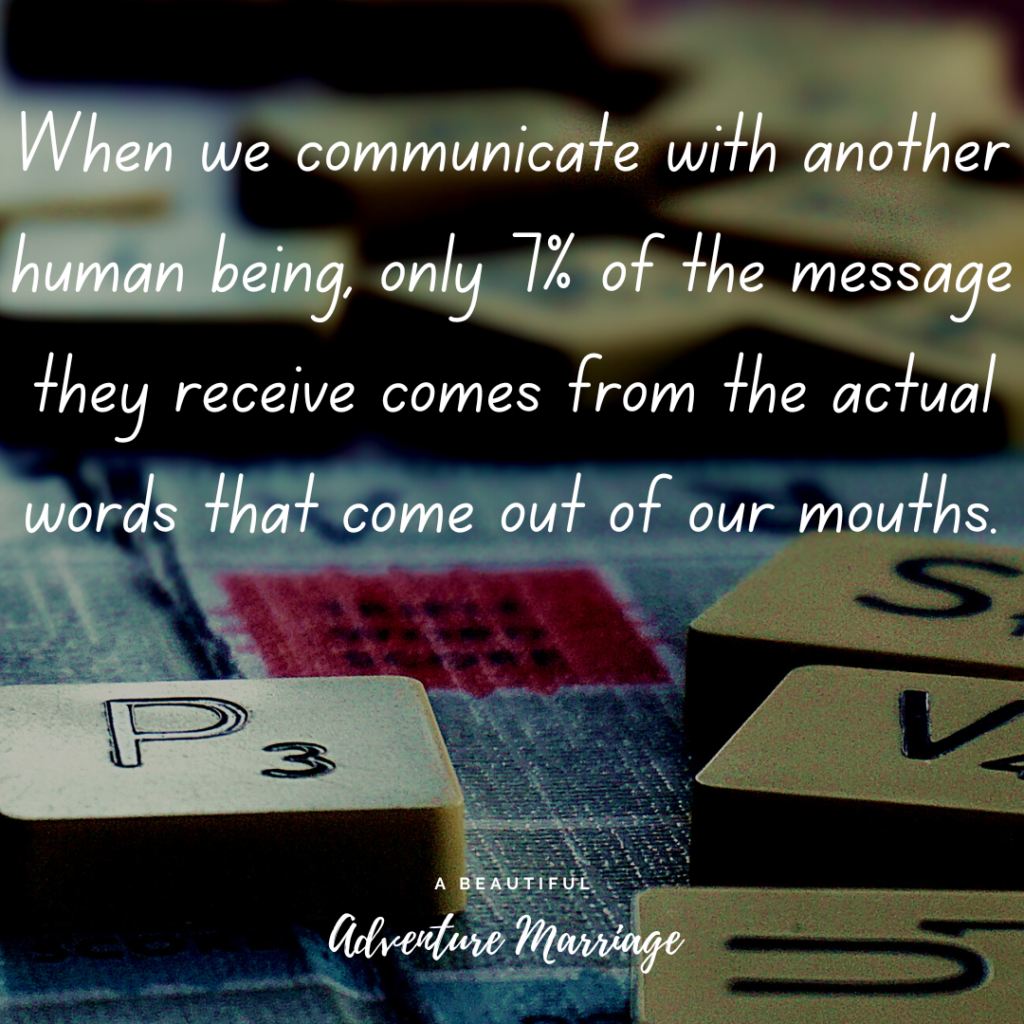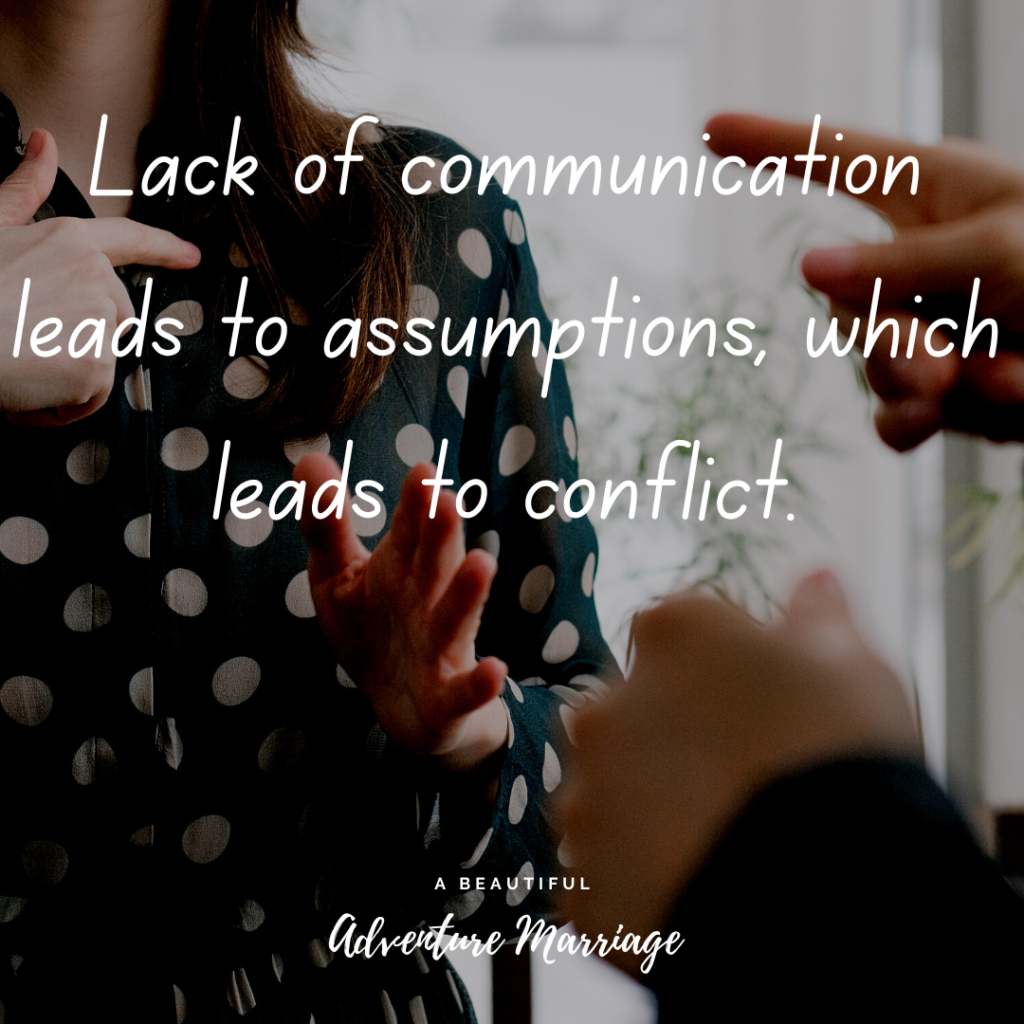Hello Friends,
Communication Breakdowns and Misunderstandings! Lack of Communication or the Silent Treatment!
If you ask any couple to name one thing they struggle with the most in their marriage, they would probably say something about communication. Communication between any two people can be difficult, but in marriage lack of communication or communication breakdowns can bring a lot of unnecessary harm. That’s why here at A Beautiful Adventure Marriage we talk about communication often. We believe communication is something that we can never learn enough about, and the more we know the better we can be at it.
Effective Communication
While it’s true that communication problems can cause a lot of harm in marriage, communication is also how you can express your love to your spouse. If it’s coupled with good and consistent behavior, it can change your marriage for the better.
There are all kinds of ways to improve your communication with your spouse. We have talked about a lot of methods here, and you can find those in our blogs and our podcast. For this blog, we are going to break down four ways to communicate more effectively. These breakdowns may seem simple at first, but you will find that they all take intentionality and thoughtfulness if they are truly going to be effective.
The Four “Must” of Effective Communication
Communication must be CLEAR.
To effectively communicate with our spouse, our communication must be clear. This means it must make sense, not only to us, but to our spouse as well. We don’t need to intentionally speak in a way that is confusing to our spouse. They shouldn’t have to decipher our words like some kind of code to “hopefully” figure out what we are trying to say.
Now this one probably seems like it would be the easiest; especially if you think you are already communicating in a clear way. Maybe you aren’t trying to intentionally confuse your spouse, which we hope is the case. However, I would dare to say that this one is the hardest.
Why is that? Great question, I would love to tell you.

So, what does this mean? It means you could say the correct words, but if you deliver those words incorrectly, your spouse has a 93% chance of receiving the wrong message. That’s wild if you think about it.
Words only account for 7% of the message received. That’s why so many marriages have communication breakdowns. One spouse is saying one thing, and the other spouse is hearing something completely different.
So how can we start implementing clear communication?
Practice the “You Said This, I Heard That” Method.
You do this by restating what you think your spouse said in your own words. This gives you the opportunity to make sure you received the message correctly. This also gives your spouse the ability to communicate the message in a different way if it wasn’t received correctly.
This method has helped Alex and I a lot in our communication. It revealed to us just how often we were receiving the wrong message and allowed us to fix it before conflict came.
Communication must be CALM.
We learned that only 7% of the message another person receives comes from our actual words. The rest of the message comes from 55% body language, and 38% tone. This shows us that staying calm and in control of our body language and tone are very important. Staying calm in a situation will always improve communication. When tempers flare it’s easy to say and do things we regret later.
By staying calm, and in control, your message will not only be received more effectively but you are less likely to wound your spouse.

So how can we start being intentional about remaining calm during a conversation?
You can do this by designating a “Pause” or “Time Out” button that can be used if you feel yourself getting frustrated to a point you can’t control.
How does this work?
In the middle of a discussion where tempers are starting to flare, you and your spouse can say “Pause or Time Out”. Once it is said, give yourself or your spouse some time to calm down. The extent of the situation will determine how long you need to pause. There are two main things that need to happen for this to work:
- You both have to agree to allow the pause to happen.
- You have to come back and get closure. You can’t say pause then never deal with the issue.
- Remember it is a pause not an ending. You will have to be especially intentional about this one if you have children. It is easy to get caught up in nightly routines and forget to circle back to the conversation. In that case, find some way to remind yourself to reconnect with your spouse. (Maybe set an alarm or write it on a sticky note.)
Communication must be CURRENT.
For communication to be totally effective, it needs to be current. This means we need to communicate with our spouses every day. There does not need to be long stretches of time when we aren’t speaking to our spouse. This also means the communication we do have needs to be up to date, and frequent. We do not need to leave anything to assumptions.
Now you can break “current” down two ways in your daily life:
- Communicating any changes that happen.
- Not being historical, especially during a conflict.
As things change, communication needs to happen. For example, if you and your spouse have agreed upon a plan, but a situation arises that affects the plan, that situation would need to be discussed and changes made. We believe a lot of conflict can be avoided by communicating changes. There are times that life happens, and change is inevitable. Although the changes may not have been your idea, if you don’t communicate them to your spouse, it can come across as you not following the plan that was communicated and agreed upon. It can also come across as you are withholding information from your spouse, when in actuality you just forgot.
If that is the case, keep a digital or physical note pad handy, and write down things that need to be talked about when you are able to sit down with your spouse. Making a few small changes can really help improve your communication and keep it current.

Another way to keep your communication current is by not becoming historical. When you are in an argument with your spouse, it’s not healthy or beneficial for you to bring up the past. That is only going to cause further strife.
Keep the argument where it is- in the present. Deal with the conflict in the moment, and directly. Being current means you are dealing with the here and now- not what happened 2 days, weeks, months, or years ago.
Communication must be CONSTRUCTIVE.
There will be times in your relationship where you and your spouse don’t see eye to eye. In some situations, it may not be a huge deal. However, there are times when a decision needs to be made quickly. What do you do in those moments when a decision has to be made but you don’t agree? You use constructive communication. Now in our next blog, we will break down several ways you can communicate in a constructive way. So, we are going to keep it simple here, and just say be empathic to your spouse!
When you have a situation where you do not agree, it can cause a lot of stress, especially if this decision will impact your future. Yelling and screaming and being downright belligerent will in no way make your communication or your marriage better. Not being emphatic can cause your spouse to feel like you do not value them or their opinion, which can lead to more issues down the road.
You can be in a place where you don’t agree with your spouse and still be emphatic to them. It will take a little more effort on your part, but it will be worth it for your marriage.
Ways to Practice Construction Communication.
Next month on April 12th, we are going to break down 4 ways you can have constructive conversations with your spouse. This blog will be so helpful for you because it will give you solid ways to navigate those tricky conversations! See you next month!
And remember you can do this!
We are praying for you!
